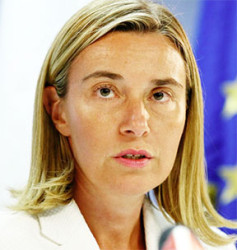In Europe a far-reaching and multi-faceted policy review is underway that is likely to result in a significant change in European priorities.
This process began last June when the EU’s High Representative (effectively Europe’s Foreign Minister) and Vice President, Federica Mogherini, was mandated by European governments to develop a new strategy on foreign and security policy.
Since then it has become clear that Mrs Mogherini has decided that what is required is a comprehensive approach that embraces every aspect of Europe’s external outreach. This will involve going far beyond traditional thinking about foreign, development or security policy. It will also incorporate the new principle of development universality, the so called Sustainable Development Goals (SDG) agreed last September at the United Nations.
 This has far-reaching implications for the Caribbean’s future relationship with Europe and others, as the region will have to adapt its approach so that any future support it may seek relates to one or more of the SDG’s seventeen globally applicable development objectives. It also suggests that the days of a privileged development relationship will go forever and the region will be competing globally for any concessional funding and support.
This has far-reaching implications for the Caribbean’s future relationship with Europe and others, as the region will have to adapt its approach so that any future support it may seek relates to one or more of the SDG’s seventeen globally applicable development objectives. It also suggests that the days of a privileged development relationship will go forever and the region will be competing globally for any concessional funding and support.
Europe’s policy review will also likely take into account the delivery of the recently approved Paris Agreement on Climate Change; the action agenda agreed in mid-2015 in Addis Ababa that established how the international community will provide future funding; and place emphasis on European concerns about instability in the Sahel, uncertainties in the Ukraine, tension with Russia, the conflict in Syria and Iraq, a refugee crisis that has become politically toxic in most EU states, and the threat of terrorist actions across Europe.
Also of relevance will be the parallel development of a new EU approach to trade that places emphasis on new agreements on services and rules for investment; on the rapid pursuit of regional free trade agreements, such as those with the US and Mercosur; and on an alternative multilateral approach at the WTO given OECD nations regard the Doha Development Round as being at an end.
To complicate matters further, the review is taking place at a time of budgetary constraints in all EU states, a political view in Europe that future official development assistance should target the least developed countries ‒ in the Caribbean this means only Haiti ‒ and that a special focus on Africa is required.
Mrs Mogherini’s review coincides with the existential debate now underway on the future of the ACP (the African, Caribbean and Pacific group of countries) and its relationship with the EU.

What is emerging in Europe is a lack of clarity as to how any post 2020 successor agreement to the EU-ACP Cotonou Convention will relate to the review she is undertaking. For example some in Europe feel that the principle of universality established in the SDGs implies that any special relationship of the kind that exists with the ACP may be at an end, while others suggest that the SDG’s demonstrate why the ACP as a group must adapt its partnership.
The matter is made more difficult as recent reports such as that by the European Centre for Development Policy Management (ECDPM) suggest that without a fundamental change of purpose, the ACP will attenuate.
Although an ACP group of eminent persons may recommend to an ACP summit in May in Papua, New Guinea, that the relationship be renewed on the basis of a ‘new’ ACP, better governance, and a more significant role for the private sector and civil society, it is unclear whether politically much of Europe still sees long term utility in a single treaty relationship.
Hopefully there will be some clarity when the EC publishes in the early part of this year a communication (policy paper) on how its sees its future ACP relationship and how it proposes undertaking negotiations for a successor agreement in 2018.
Mrs Mogherini is expected to present her recommendations in June 2016 following a series of public debates.
If the Caribbean is to have any hope of finding a place in this fundamentally changed policy environment it needs to politically mobilise support in Europe’s 28 nations, almost all of which have no historic relationship with a region most regard as marginal. In doing so it should demonstrate where it fits in the changed global order, what its justifiable needs are given it largely consists of middle-ranking largely services-oriented economies, and what it is going to give politically in return to Europe.
The present absence of strategic political direction and emphasis in this respect is concerning.
In the last eighteen months the world has become a significantly less certain place. The global balance of power has changed. The once assumed interest shown in the region by the major powers is fading as their political, economic and strategic attention has been relocated elsewhere by storm and conflict.
The problem with doing nothing, or very little, and failing to have a clear and straightforward regional public narrative that has popular support, is that the region’s voice will go unheard, the world will forget, and move on.
It is for this reason that regular high level personal political contact matters, as for instance unscheduled private conversations between the British Prime Minister and some Caribbean leaders at the Commonwealth Heads of Government meeting in Malta recently demonstrated. It suggests that in the absence of regular pan-European ministerial visits, a senior regional figure such as a former Caribbean Prime Minister be entrusted with a clear agenda and developing ties to political and official counterparts across Europe.
More generally, there is a pressing need for the region and individual nations to rapidly redefine future requirements in the terms of the SDG’s objectives, identify how the Caribbean is to achieve deliverables from the recent climate change agreement, and to work out how to have credible figures from the private sector and civil society engaged and out-front in discussing future needs.
In short, any lingering sense of entitlement needs to be abandoned and a new narrative developed that recognises that European thinking and that of other donor states is evolving and leaving the Caribbean behind.
Previous columns can be found at www.caribbean-council.org





